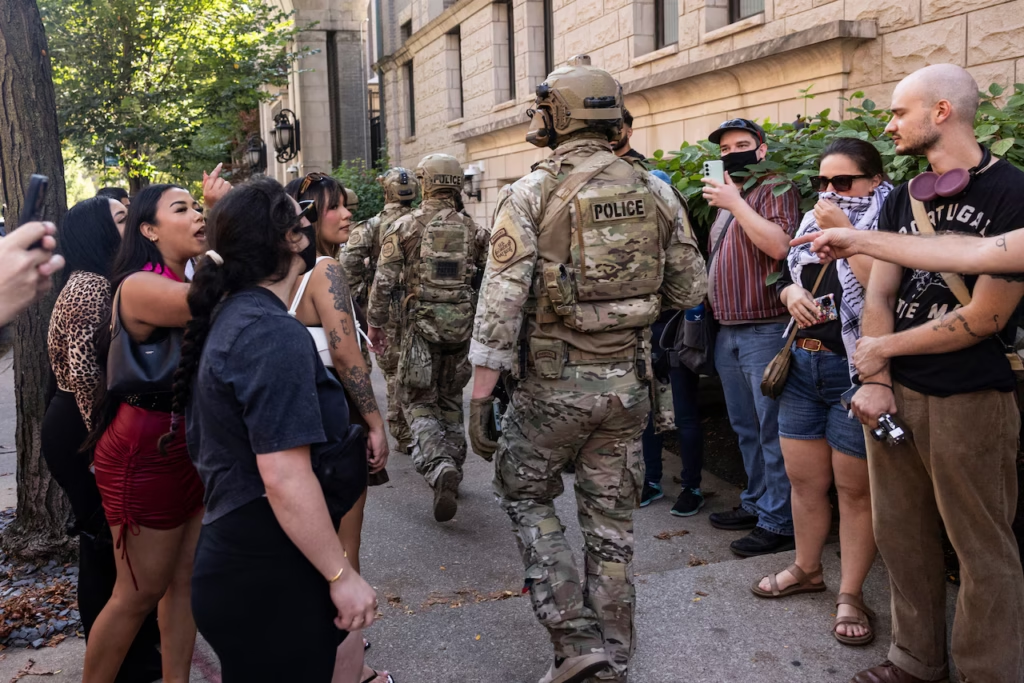“From Chicago to Portland to Memphis, federal law enforcement activity has sparked questions, concerns, and plenty of headlines.”
In recent weeks, the presence of federal law enforcement in Chicago, Portland, and Memphis has sparked heated debate across the country. Some see it as a necessary step to strengthen security and fight crime, while others worry it represents federal overreach into local matters.

For residents, the sight of federal officers on city streets has stirred mixed emotions—ranging from relief to unease. Is this a move to restore order, or is it a political statement playing out in real time?
Understanding why federal agents are in these cities, what their roles actually are, and how communities are responding is key to making sense of the bigger picture.
What Sparked Federal Involvement?
The presence of federal law enforcement in Chicago, Portland, and Memphis didn’t come out of nowhere. Each city has faced its own challenges—ranging from spikes in violent crime to large-scale protests—that caught national attention. Federal officials argued that stepping in was necessary to support local law enforcement and maintain order.
In Chicago, the concern centered on rising gun violence and public safety. Portland became a flashpoint during ongoing protests, where clashes between demonstrators and local police escalated into tense standoffs. Memphis, meanwhile, has been navigating both crime concerns and community unrest.
The federal government framed its involvement as a way to restore peace and protect critical infrastructure. But to many residents and leaders, the move raised difficult questions: Was this truly about safety, or about politics and control?
What Federal Agencies Are Doing
So what exactly are these federal agents doing in Chicago, Portland, and Memphis? That’s one of the big questions people have been asking. According to officials, the mission varies by city but often includes things like protecting federal buildings, assisting local police with investigations, and responding to violent crime.
In Portland, for example, agents from the Department of Homeland Security were stationed to guard courthouses during protests that sometimes turned destructive. In Chicago, federal officers were sent to work alongside local law enforcement in efforts to address gun violence and gang activity. Memphis saw federal support tied to both crime prevention and crowd control.

While these roles may sound straightforward on paper, in practice they’ve raised concerns. Residents and city leaders have questioned whether the federal law enforcement activity is truly helping or simply escalating tensions. Supporters argue the presence brings much-needed resources, while critics worry it blurs the line between local and federal responsibilities.
Put simply, the federal agents’ role depends on where they’re deployed, but their presence has become part of a much larger national debate about policing, power, and trust.
Community and Local Government Reactions
The arrival of federal agents in cities like Chicago, Portland, and Memphis has been met with mixed emotions. For some residents, the extra presence feels like a step toward safer streets. They see the added resources as a way to tackle violent crime or protect federal property during times of unrest.
But many others—especially community activists and local leaders—have voiced frustration and concern. In Portland, city officials argued that the federal presence actually inflamed tensions during protests, making confrontations more likely instead of calming them down. In Chicago, some leaders worried that federal involvement would undermine local authority and create mistrust between communities and law enforcement. Memphis saw similar debates, with residents questioning whether outside officers truly understood the city’s needs.
At the heart of these reactions is a common theme: people want safety, but they also want solutions that respect local voices and community trust. The tension between federal involvement and local control has become one of the most defining issues of this debate.
Political Debate and National Implications
The arrival of federal agents in American cities hasn’t just been a local story—it’s fueled a larger political debate about federal law enforcement and its proper role in communities. On one side, supporters argue that the federal government has a duty to step in when crime rises or protests threaten public safety. On the other, critics see it as government overreach that risks undermining democracy and civil liberties.
This clash of perspectives has turned into a hot-button issue in Washington, with lawmakers split along party lines. For some, the deployments represent strength and order; for others, they raise alarms about misuse of federal power.
The national implications of federal activity go beyond Chicago, Portland, and Memphis. These deployments could set a precedent for how future administrations respond to unrest or local crises. Will federal agents become a common sight in cities facing challenges? Or will pushback from communities force a reevaluation of this approach?
What’s clear is that the debate isn’t just about crime or protests—it’s about who gets to decide how America’s cities are kept safe, and what balance should exist between local autonomy and federal authority.
Conclusion
The recent deployments of federal law enforcement in U.S. cities have stirred both relief and controversy, leaving many residents asking what this means for the future of public safety and local governance. The situations unfolding in Chicago, Portland, and Memphis highlight how complex and sensitive this issue really is—each city has its own story, challenges, and community concerns.For those following closely, it’s not just about officers on the ground—it’s about what to know in Chicago, Portland, and Memphis when it comes to the balance between federal authority and local control. While the debate continues at both the community and national level, one thing remains certain: how these moments are handled could shape future policies and the relationship between cities and Washington for years to come.